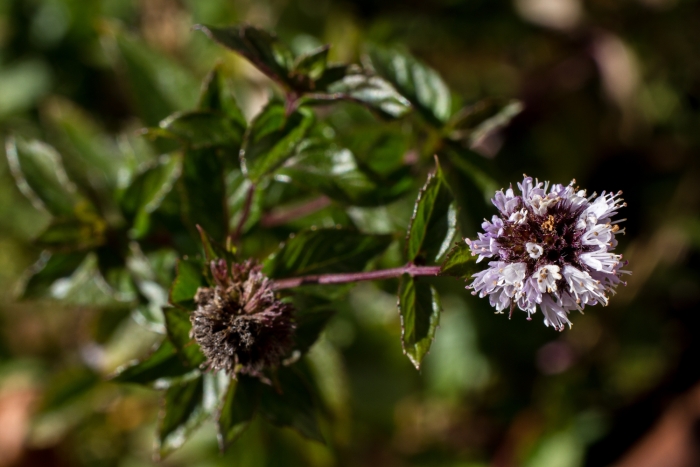Peppermint
(Mentha ×piperita)
Peppermint (Mentha ×piperita)
/
/

© Fyn Kynd
CC BY-SA 4.0
Image By:
© Fyn Kynd
Recorded By:
Copyright:
CC BY-SA 4.0
Copyright Notice:
Photo by: © Fyn Kynd | License Type: CC BY-SA 4.0 | License URL: http://creativecommons.org/licenses/by-sa/4.0/ | Uploader: fynkynd | Publisher: iNaturalist |
























Estimated Native Range
Summary
Peppermint, Mentha × piperita, is a hybrid species of mint, a cross between watermint (Mentha aquatica) and spearmint (Mentha spicata), native to Europe and the Middle East. As a herbaceous, rhizomatous perennial, it typically grows to a height of 12-35 inches, featuring smooth stems and dark green, toothed leaves. Peppermint is known for its highly aromatic leaves, which are widely used for their cooling, minty flavor in culinary applications and for their essential oils in aromatherapy and medicinal products. The plant produces small, purple flowers in terminal spikes from July to August, which are attractive to bees and other pollinators.
In cultivation, peppermint is valued for its ease of growth and maintenance, as well as its aromatic leaves, which can be harvested throughout the growing season. It is commonly used in herb gardens, as a fragrant ground cover, and for naturalizing in moist areas. Peppermint prefers full sun to part shade and grows best in moist, well-drained soils. It requires regular watering, especially in dry conditions. Gardeners should be aware that peppermint can be quite aggressive, spreading through its underground runners, and may become invasive if not contained. It is susceptible to rust and other fungal diseases, especially in humid conditions. To prevent its spread, it is often recommended to plant peppermint in containers or confined spaces.CC BY-SA 4.0
In cultivation, peppermint is valued for its ease of growth and maintenance, as well as its aromatic leaves, which can be harvested throughout the growing season. It is commonly used in herb gardens, as a fragrant ground cover, and for naturalizing in moist areas. Peppermint prefers full sun to part shade and grows best in moist, well-drained soils. It requires regular watering, especially in dry conditions. Gardeners should be aware that peppermint can be quite aggressive, spreading through its underground runners, and may become invasive if not contained. It is susceptible to rust and other fungal diseases, especially in humid conditions. To prevent its spread, it is often recommended to plant peppermint in containers or confined spaces.CC BY-SA 4.0
Plant Description
- Plant Type: Herb
- Height: 1-3 feet
- Width: 1-3 feet
- Growth Rate: Rapid
- Flower Color: Purple
- Flowering Season: Summer, Fall
- Leaf Retention: Deciduous
Growth Requirements
- Sun: Full Sun, Part Shade
- Water: Medium
- Drainage: Medium
Common Uses
Bee Garden, Butterfly Garden, Edible*Disclaimer: Easyscape's listed plant edibility is for informational use. Always verify the safety and proper identification of any plant before consumption., Fragrant, Groundcover, Low Maintenance, Potted Plant
Natural Habitat
Native to moist environments in Europe and the Middle East
Other Names
Common Names: Garden Mint , Mint
Scientific Names: Mentha ×piperita , Mentha aquatica f. piperita , Mentha aquatica var. langii , Mentha aquatica var. piperita , Mentha aquatica x spicata , Mentha aquatica × spicata , Mentha canescens var. schultzii , Mentha glomerata var. piperita , Mentha hortensis var. citrata , Mentha lavanduliodora
GBIF Accepted Name: